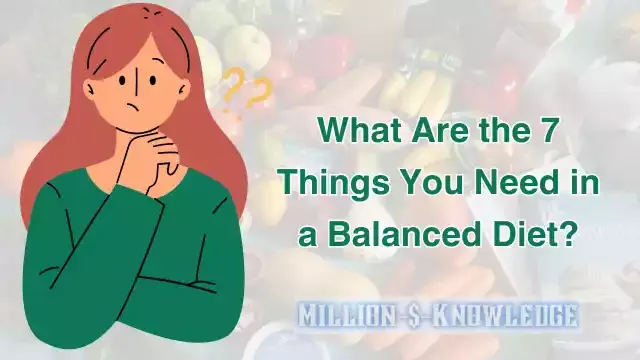What Are the 7 Things You Need in a Balanced Diet?
Have you ever wondered what it takes to achieve a healthy and balanced diet? Today, we'll be exploring the 7 essential components that should be included in your daily meals to promote overall well-being.
A balanced diet not only helps you maintain a healthy weight but also provides the necessary nutrients for optimal physical and mental health.
Whether you're a fitness enthusiast or simply looking to improve your lifestyle, understanding these 7 vital elements will set you on the path to a nourishing and wholesome diet.
Join us as we uncover the secrets behind a truly balanced diet!
 |
| 7 Things You Need in a Balanced Diet |
🍲Table of Contents:
7 things you need in a balanced diet
Carbohydrates
Carbohydrates are the body's primary source of energy. Foods like whole grains, fruits, and vegetables contain complex carbohydrates that our bodies can break down into glucose for energy. It is important to choose whole, unprocessed carbohydrates over refined ones as they provide additional nutrients and fiber.
Proteins
Proteins are the building blocks of our body. They are responsible for repairing and building tissues and organs, supporting immune function, and producing enzymes and hormones. Good sources of protein include lean meats, poultry, fish, eggs, dairy products, legumes, and nuts.
Fats
Contrary to popular belief, fats are an essential part of a balanced diet. They provide energy, support cell growth, protect organs, and help in the absorption of certain vitamins. However, it is important to choose healthy fats like avocados, nuts, seeds, fatty fish, and olive oil, while limiting the intake of saturated and trans fats found in processed and fried foods.
Vitamins
Vitamins play a crucial role in maintaining our overall health. They help regulate bodily functions and support our immune system. While there are many different vitamins, some of the key ones include vitamins A, B, C, D, E, and K. It is best to attain vitamins through natural food sources like fruits, vegetables, whole grains, lean proteins, and dairy products.
Minerals
Minerals are essential for numerous bodily functions such as bone health, nerve function, and the production of hormones. Some important minerals include calcium, iron, zinc, potassium, and magnesium. Including a variety of nutrient-rich foods like dairy products, nuts, seeds, whole grains, and green leafy vegetables can ensure an adequate intake of minerals.
Fiber
Fiber is a type of carbohydrate that is indigestible but essential for maintaining digestive health. It aids in digestion, prevents constipation, and lowers the risk of certain diseases. Foods rich in fiber include whole grains, fruits, vegetables, legumes, and nuts.
Water
While not a nutrient, water is perhaps the most vital component of a balanced diet. It plays a role in every bodily function, including digestion, metabolism, temperature regulation, and the transportation of nutrients. Staying hydrated is crucial for overall health, so it is recommended to drink at least 8 glasses of water per day.
Conclusion
A balanced diet should include all seven of the above, with each of these components playing a unique role in supporting our overall health and well-being.
By incorporating a variety of nutrient-rich foods into our diet, we can ensure that our bodies receive the vital nutrients they need to function optimally.
Remember, it is not about perfection but about making conscious choices to nourish our bodies and live a healthier, happier life.
READ MORE:





